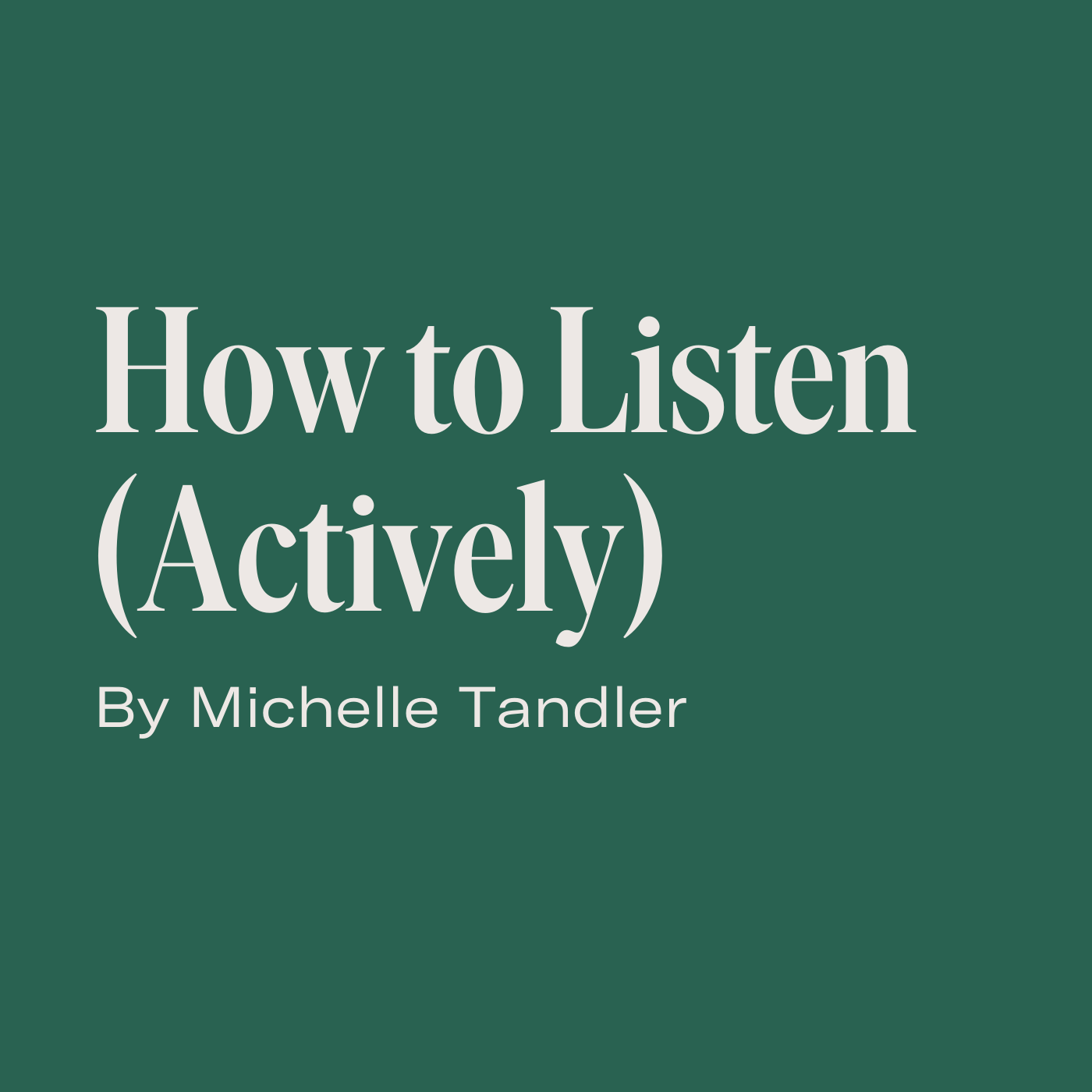“Very important people have told me that they prefer good listeners to good talkers, but the ability to listen seems rarer than almost any other good trait. And not only important personages crave a good listener, but ordinary folk do too.” - Dale Carnegie. How to Win Friends and Influence People
“I had listened intently. I had listened because I was genuinely interested. And he felt it. Naturally that pleased him. That kind of listening is one of the highest compliments we can pay anyone. “Few human beings,” wrote Jack Woodford in Strangers in Love, “few human beings are proof against the implied flattery of rapt attention.” - Dale Carnegie. How to Win Friends and Influence People
📝 Notes:
What is active listening?
Active listening means letting the other person know that he or she has been heard. You do this by involving yourself in the conversation, making clarifying statements, asking questions, summarizing what you have heard, and using appropriate visual and vocal cues. The best listeners are active ones.
More specifically it has three aspects:
Cognitive: paying attention to the information (explicit & implicit) - comprehending and integrating the information
Emotional - staying calm and compassionate, managing emotional reactions (e.g., annoyance, boredom)
Behavioral - conveying interest and comprehension verbally and nonverbally
Why is this hard? → Gap between comprehension and speaking - most people speak 80-120 words per minute - but many people can comprehend at a higher rate → even up to 1000 words per minute! So there is a 900 word per minute gap - easy to tune out and think of other things and then check back in. But you will inherently miss something - so you must *actively* listen - not easy, especially for fast thinkers.
Why listen?
Will keep you from talking too much - which can give you a reputation for being a know it all - nobody likes that
Learn a lot - what is going on, gain insights and information
Build connection & rapport (aka friendship) – required for any conversation – people like being around good listeners - everybody wants to feel heard - a very basic part of human needs is to feel respected, liked, and appreciated
Build trust & makes people feel good - people want to be heard, recognized → “I commit to being a person to whom others can express themselves with candor.”
Can de-escalate a dicey situation - “The chronic kicker, even the most violent critic, will frequently soften and be subdued in the presence of a patient, sympathetic listener—a listener who will be silent while the irate fault-finder dilates like a king cobra and spews the poison out of his system.” - Dale Carnegie.
“When this candor is met with curiosity and deep listening “Tell me more about that thought. I’m curious to know what you think,” amazing breakthroughs of insight and innovation often occur. – 15 commitments
“He had wanted merely a friendly, sympathetic listener to whom he could unburden himself. That’s what we all want when we are in trouble. That is frequently all the irritated customer wants, and the dissatisfied employee or the hurt friend. -Dale Carnegie.
Shows respect for people’s ideas, experience and opinions: “one of the most sincere forms of respect is actually listening to what another has to say.” - Bryant McGill
Ultimately, it will make you a great manager. As HBR writes, “employers who fail to listen and thoughtfully respond to their people’s concerns will see great turnover”
How to do it?
Don’ts:
Talk too much - even if you think your own voice is the most beautiful sound in the world - if you are talking, you aren’t listening! Also you run the risk of boring people and alienating them as well
Interrupt, contradict → it’s distracting and irritating for the other person, makes them want to end the conversation (or leave altogether)
“If you want to know how to make people shun you and laugh at you behind your back and even despise you, here is the recipe: Never listen to anyone for long. Talk incessantly about yourself. If you have an idea while the other person is talking, don’t wait for him or her to finish: bust right in and interrupt in the middle of a sentence.” - Carnegie
Respond with mere silence → the person may wonder if you are paying attention - better to show that you are listening
When you finally talk, turn the conversation back to yourself – you should instead continue the other person’s line of communication
Do other things while listening - nothing is worse than sharing something with someone that matters to you only to hear their clicking away on a keyboard or phone - and then say “sorry what were you saying?” → if you need to attend to something urgent, say “I’m so sorry but will you hold that thought for a moment? I have something urgent that just came across my desk”
Think about what you will say next - you are then not listening:
“many people fail to make a favorable impression because they don’t listen attentively. “They have been so much concerned with what they are going to say next that they do not keep their ears open. - Dale Carnegie.
Apply a listening filter:
DIAGNOSE: “The problem with your manager is…”
CORRECT: “This isn’t really an operations issue, this is a strategy problem.”
AVOID CONFLICT: “I’m sure that they didn’t mean that; I’m sure you can work it out”
DEFEND: “Are you suggesting that I did something wrong?”
Do’s:
Listen often! Many new managers have the mistaken idea that the minute they are promoted everyone is going to hang on every word they say. That is the wrong approach. The more they listen, the more successful they will be. How much listening is enough? As a starting point, make sure that you are doing at least twice as much listening as talking. - The First-Time Manager
“You have two ears, two eyes, one mouth” → use them in proportion
Control your thoughts (e.g., discussing a problem with an employee, other thoughts may enter your mind) – if you are particularly bothered by one you may want to stop the conversation - you can say “give me a moment to get this thought out of my mind so I can fully focus on what you’re saying” – then write it down and get back to active listening - this will ensure you are fully present and not accidentally sending a nonverbal message that you are distracted
Listen with your mind, not just your ears - (aka pay attention)
Listen to what the person is feeling as they speak - find the core desire behind the content; Listen to the three centers of intelligence - head center (words, thoughts & beliefs), – can repeat back to ensure you accurately heard them; heart center (emotions being expressed directly or indirectly) – look at tone of voice, facial expressions, breath; gut/instinctive center
Use appropriate signals at the right time - don’t “uh huh” rush them - take a pause, say “uh-hm, “right”, “that makes sense”, “interesting”, “why do you think that she said that?”, “why did you feel that way”, “say more?”, “tell me more?” “I see what you mean” – you can also nod, keep eye contact (don’t stare too hard), smile (shows you are enjoying the conversation) – can also repeat back a few words (e.g., “and then you tore up the paper - wow”) – gives you some time to pause and think about how to respond
Ask questions - ensures you understand and prompts for more detail
Restating - “the height of active listening” (first time manager) – shows you were engaged and it reduces the chance you were mistaken in your understanding – (e.g., “let me make sure I understand what you’re saying” - “If I am hearing this correctly, you ___” or “what I’m hearing is X” — ABC – “is that right?” – shows you understand and value what the person is saying → but note, this can increase emotional friction and mental load - only use this if you really need to check comprehension and say “I’m going to put this in my own words” (HBR)
Make sure that your tone, words & body language match up - if you say “well THAT’S interesting” in a nasty tone, you will be doing more damage than good
Minimize distractions - itchy outfit, hot, noisy environment, interruptions – if you are preoccupied try to remove the distractions and take time to re-center – additionally, if you are anticipating a difficult conversation - take time to get into a calm headspace so you can focus (e.g., block some time before to do breathing or go for a walk)
If you aren’t fully present, be upfront (e.g., if you are sick, tired, distracted)
Stay grounded - if you feel agitated, and anxious to respond, try some deep breathing (be subtle though as deep sighs can make you look bored)
Allow yourself to view this as a skill - if it doesn't come naturally, role play/practice - eventually it will become second nature
Be patient - with yourself and your partner in conversation! We can all become better listeners. If you are struggling with this skillset, give yourself a break!
✅ Tactical next steps:
If you think you listen actively (consciously) ask some people you work with (or are close to) if they feel comfortable being candid and open with you
You could also ask for feedback on your listening skills
Think about your listening skills at work and in your personal life - do they differ? How do you listen to your best friends? Your boss? Your teammates? Your direct reports?
Observe other people in their listening. Who do you know who is a great listener? What makes them so great at listening? Consider giving them a compliment! Everybody wants to be a great listener.
🗣 Extra quotes:
“A man who met Freud described his manner of listening: “It struck me so forcibly that I shall never forget him. He had qualities which I had never seen in any other man. Never had I seen such concentrated attention. There was none of that piercing ‘soul penetrating gaze’ business. His eyes were mild and genial. His voice was low and kind. His gestures were few. But the attention he gave me, his appreciation of what I said, even when I said it badly, was extraordinary. You’ve no idea what it meant to be listened to like that.” - Dale Carnegie
“So if you aspire to be a good conversationalist, be an attentive listener. To be interesting, be interested. Ask questions that other persons will enjoy answering. Encourage them to talk about themselves and their accomplishments. - Dale Carnegie.
One of the greatest gifts we give one another is to listen deeply to what the other person most wants. - The 15 Commitments of Conscious Leadership:
🎓 Further Study:










